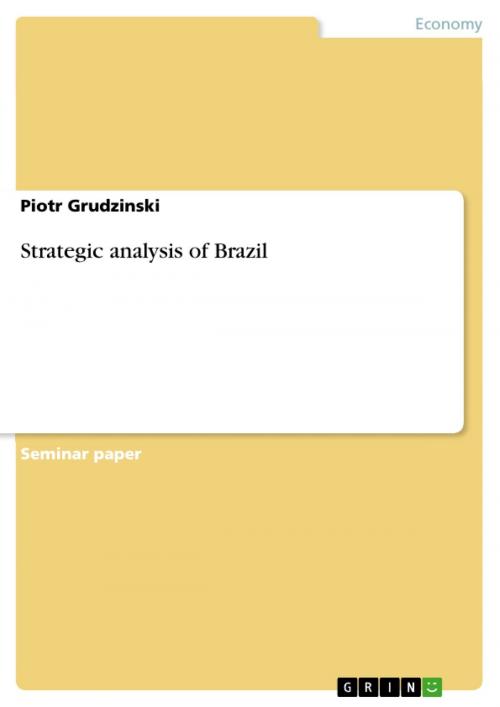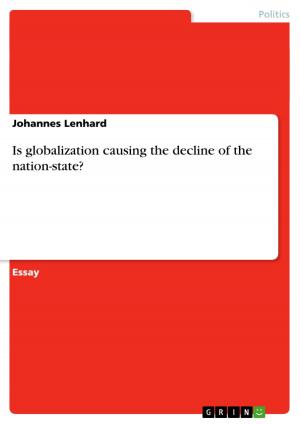| Author: | Piotr Grudzinski | ISBN: | 9783638530200 |
| Publisher: | GRIN Publishing | Publication: | August 4, 2006 |
| Imprint: | GRIN Publishing | Language: | English |
| Author: | Piotr Grudzinski |
| ISBN: | 9783638530200 |
| Publisher: | GRIN Publishing |
| Publication: | August 4, 2006 |
| Imprint: | GRIN Publishing |
| Language: | English |
Seminar paper from the year 2006 in the subject Economics - Case Scenarios, grade: 1,7, Furtwangen University, course: Doing Business in Latin America, 10 entries in the bibliography, language: English, abstract: Brazil is the biggest Latin American Nation with 177 million people. It is the one with most inequalities, but most would agree also with the biggest potential to become a continental leader and maybe a first reformist and innovator in the region. However no country can maintain sustainable development without diminishing economic and social problems. A main issue in most countries in Latin America, also in Brazil is poverty. Antipoverty efforts have increasing priority among socio-political objectives both internally (within governing bodies), as internationally within organizations involved in anti-poverty policies. As a consequence it has to be defined what is poverty, how to measure it? Income/Consumption Method has the widest use measure economic aspect. The other methods focus on social inequalities like: access to social institutions, social security, differences in social legitimacy and status, inequalities of freedom and social and political participation. It seems targeting poverty issue through reforms, deregulation, FDI may give Brazil a chance for a fast paced growth. The question arises what is the current situation in the country? What other factors influence the lingering 'status quo'? Focus and Layout: A strategic analysis of the country Brazil is intended. Starting frommacroeconomic tendencies, key economic factorswill be discussed in comparison to the general development of these in the region. Presentation ofeconomic structureis intended. Deriving from the above, discussion aboutpovertyis intended. Here, both economic perspective (income inequality), as socio-political view is to be presented (socio-political inequality i.e. due to social exclusion and impossibility of certain populations to access key social services). Different poverty dimensions will be addressed. This paper will present a framework of aspects that make the poverty in Brazil a lingering, persevering state. Last but not least thepolitical assessmentandfuture viewon development of country will be shown.
Seminar paper from the year 2006 in the subject Economics - Case Scenarios, grade: 1,7, Furtwangen University, course: Doing Business in Latin America, 10 entries in the bibliography, language: English, abstract: Brazil is the biggest Latin American Nation with 177 million people. It is the one with most inequalities, but most would agree also with the biggest potential to become a continental leader and maybe a first reformist and innovator in the region. However no country can maintain sustainable development without diminishing economic and social problems. A main issue in most countries in Latin America, also in Brazil is poverty. Antipoverty efforts have increasing priority among socio-political objectives both internally (within governing bodies), as internationally within organizations involved in anti-poverty policies. As a consequence it has to be defined what is poverty, how to measure it? Income/Consumption Method has the widest use measure economic aspect. The other methods focus on social inequalities like: access to social institutions, social security, differences in social legitimacy and status, inequalities of freedom and social and political participation. It seems targeting poverty issue through reforms, deregulation, FDI may give Brazil a chance for a fast paced growth. The question arises what is the current situation in the country? What other factors influence the lingering 'status quo'? Focus and Layout: A strategic analysis of the country Brazil is intended. Starting frommacroeconomic tendencies, key economic factorswill be discussed in comparison to the general development of these in the region. Presentation ofeconomic structureis intended. Deriving from the above, discussion aboutpovertyis intended. Here, both economic perspective (income inequality), as socio-political view is to be presented (socio-political inequality i.e. due to social exclusion and impossibility of certain populations to access key social services). Different poverty dimensions will be addressed. This paper will present a framework of aspects that make the poverty in Brazil a lingering, persevering state. Last but not least thepolitical assessmentandfuture viewon development of country will be shown.















